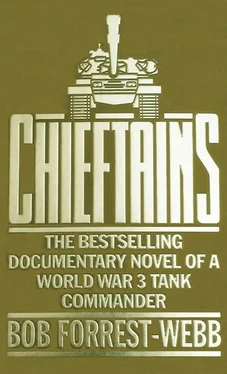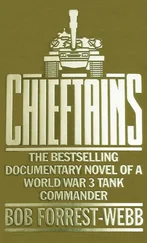Officially, Captain Fellows’ troop was known as a ‘stay-behind-unit’. There were others, mostly infantry. Their job was to remain in concealment until the first echelons of an enemy attack had passed, and then to harrass and disrupt the logistics columns or communications wherever possible. That was fair enough, sensible tactics, but the German commander had, in Fellows’ opinion, allowed his enthusiasm for guerrilla warfare to obscure the impracticability of the plans he had developed for a unit whose normal duties were reconnaissance.
Mick Fellows was waiting with his Scimitar troop in a concrete bunker within a kilometer of the East German border, in dense pine woods between the villages of Bahrdorf and Rickensdorf to the south-east of Wolfsbug. His German commander’s belief was that any major Soviet assault in his sector would have as its centre-line the autobahn which ran from Helmstedt to Hannover, and he had deployed his troops for that eventuality.
The bunker was carefully concealed. The Scimitars it contained were not those Fellows’ troop normally used for training; these four had lain in readiness in the bunker since the slow build-up towards hostilities two and a half years previously. No tank or vehicle tracks, which might reveal their presence to enemy aircraft or surveillance satellites, led to their position.
The red glow of the lighting within the Scimitars’ bunkers removed all the opposing colour, blending the overalls of the men and the camouflaging of the tanks into the rose shadows. The air was warm, oil-scented. Earlier in the day the exhausts of the vehicles had been coupled to the ventilation system and each engine tested; now there was little to do but wait. At the far end of the bunker were a platoon of the 22nd SAS, their faces daubed with camouflage cream. They appeared casual, relaxed, some of them dozing or playing cards. There was no way in which Fellows could have identified their officer or the NCOs by their dress or weaponry.
His Scimitar commanders, all lieutenants, were studying the map on a low table near the bunker’s radio equipment. He joined them. He could sense the keen edge of nervous anticipation in the tense manner of their conversation; it was no different from the pre-patrol anxiety they had all experienced in Northern Ireland. Tonight none of them knew exactly what to expect. Even Fellows himself had no experience of battle, other than that simulated in exercises; but he knew that no matter how startling the explosions of dummy mines and shells close to the aluminium hull of the Scimitars, they would bear little resemblance to the real thing. Fellows had awakened from a nightmare when he had attempted to sleep earlier in the evening. In his dream his Scimitar had faced a ring of Soviet T-80s, a hundred of them encircling him, the muzzles of their 122mm guns following him as he sought desperately to escape. His own gunner was picking target after target with the Scimitar’s Rarden, firing the light 30mm cannon in short bursts. The shells were splattering ineffectively against the massive T-80 hulls, and Fellows’ driver seemed unable to manoeuvre to find the weaknesses on their sides. Helplessly, he watched as one moved towards him, as though to indicate it desired single combat; a Goliath against a David Fellows had experienced the terror of imaginary death, watching the dark muzzle of its gun selecting a target on the Scimitar’s vulnerable aluminium body. He had seen the belch of white fire… and awakened sweating. He understood the feelings of his men.
‘Winning the war?’ He tried to sound lighthearted and casual, but realized his attempt to reproduce the kind of conversational voice he might have used in the mess probably had the opposite effect. He had spoken to Sache- Worrel, a baby-faced twenty-one year old less than a year out of Sandhurst. Sache-Worrel was barely five feet eight in height, and looked as though he should still be at school. Fellows doubted if the second lieutenant needed to shave more than once a week.
He suspected the man was blushing. Sache-Worrel always blushed whether the words addressed to him were a compliment or a reprimand. ‘No, sir.’
A first lieutenant, a little older and much more confident, joined the conversation protectively. ‘We were discussing Hannover, sir. It’s bound to be a key Soviet Red.’
‘Probably. The areas of densest population always have it rough in wartime. They’ll come in for heavy bombing in the industrial regions. I don’t think I’d like to be a civilian in any of the German cities, and Hannover is a major link in the rail and road systems. But it’s not our problem…’ He jabbed a finger at the chart. ‘This is our patch; and now, this sector…’
‘His grandparents live in Hannover, sir,’ interrupted the first lieutenant.
‘I’d forgotten,’ admitted Fellows. That was careless, he thought. He should have remembered Sache-Worrel’s mother was German. His father had met her while serving in the British Army. He too had been a professional soldier; an officer in the infantry. ‘Don’t worry, we’ll hold them long before Hannover.’ He tried to sound convincing.
‘At the River Fuse,’ the first lieutenant spoke firmly, as if he felt it necessary to confirm Fellows’ words for his friend’s benefit.
Fellows didn’t bother to reply. He glanced at his watch, it was 03.40 hours exactly. It would be dawn in forty-five minutes. He wondered what was happening behind the frontier. Intelligence would have a pretty good idea back at headquarters, but Fellows’ squadron was committed to total radio silence.
The most northerly-situated tank of the Fifth United States Force was commanded by Master Sergeant Will Browning. He was one of the few men in November Squadron with battle experience. He was one of the even fewer men in the entire United States Army in Europe who had survived a direct hit on a previous tank by a communist shell fired From a Russian-built T-54. He had been in action below Mutter’s Ridge, north of Dong Ha in Vietnam.
Browning tried to think about the incident as little as possible. His survival was miraculous… a mistake had been made… he should have died with his crew. Almost superstitiously, it seemed better not to remind a God that he had overlooked a heavenly candidate who was now living on stolen time.
The 100mm high explosive shell had struck between the centre of Browning’s M48’s track and the bustle of its turret. The US tank’s gunner had been following a VC target moving away to the right.
The M48’s cast-steel turret was torn clean from the tank and hurled fifteen meters away. Somehow it carried Will Browning with it, still in one piece. A fraction of a second later the tank’s ammunition exploded, tearing the already wrecked hull and the bodies of the crew into fragments. Browning was protected from greater injuries by the casing of the turret. He had suffered multiple fractures, burst eardrums and shrapnel wounds in his thighs and buttocks. Had he been a conscript the wounds would have ended his service, but as a regular cavalryman he was pronounced fit for further service eight months later.
It had not rained in the mountains of the Hohe Rhön east of Fulda, and the night had been clear and sharp with a touch of frost in the air above the high ground. To the front of the cavalry position the River Ulster followed the line of the East German border, before dissecting it two kilometers to the north. Backing them, three kilometers to the rear of the hill, was the highway linking Tann with Fulda where the Black Horse 11th Cavalry had been stationed.
Like most of those guarding the eastern frontier at this time, Master Sergeant Will Browning had been thinking about his own future. There was every possibility of war, and he knew that unlike most occasions in the past it would not begin with the signing of a declaration. Pearl Harbour had taught the USA a hard lesson, and with modern weapons a determined enemy would be foolish to give formal notice of its intentions by more than minutes. The preparations he had watched during the past hours no longer resembled those of an exercise. Three minefields had been laid in the fields beside the river; meadows which normally contained grazing cattle were now empty. Helicopters had flown across the woodland on the far slopes, seeding the forest tracks and glades with anti-personnel mines. When he had left Fulda, he had seen a party of German combat engineers placing demolition charges in the bridge. It was a simple and precise task, for every bridge of possible strategic importance built in West Germany since the Second World War had been constructed with future demolition in mind: special chambers to hold explosives were sited at critical points of their structures.
Читать дальше












